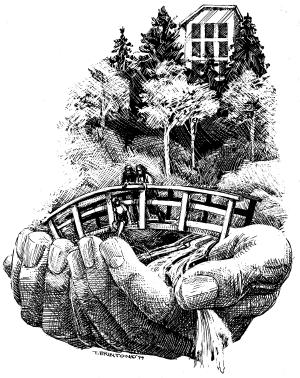|
Issue Date: December 12, 2003
By RICH HEFFERN One of the fastest-growing businesses in the country is the self-storage enterprise. Those fenced compounds with long rows of garage-type modules spring up everywhere you look. It’s a multibillion-dollar industry, with more than 30,000 facilities nationwide, most of which are rented by people who simply have too much stuff and need a place to put it. There are even provisions in many mail order catalogs now for delivering your order directly to your storage area. These “stuff” camps are apt emblems of the current hegemony of consumerism. There are big bucks being made and a lot of power being gathered by those who promote consumerism. We pay for it in gradually limited economic mobility, pollution, threats to our health and a declining standard of living, as measured by the things that really matter. Consumerism replaces the normal desire for an adequate supply of life’s necessities, community life, a stable family and healthy relationships with an artificial, ongoing and insatiable quest for “stuff” and the money to buy it, with little regard for the true utility of what is bought. The opposite of wealth is not poverty, perhaps, but sufficiency. It means having enough. Sufficiency is not a matter of sacrifice and deprivation; it’s a means of working out different ways of achieving satisfaction in our lives. Sufficiency is the concept that drives a simple, sustainable way of life.
A sufficient life means being a bright, creative part of the solution rather than one more tired cog in the dreadful turning wheels of the problem. Sufficiency involves the virtues of thrift and frugality. It comes through innovation and creativity. It looks something like this: A friend, Susan, reuses her bath and dishwater, hauling it out to the garden for her vegetables. She gets exercise and cuts down on her water bill, while at the same time deriving a quiet satisfaction from this way of living lightly on the planet. On a napkin Susan drew the Green Triangle for me of money, health and environment. She told me that ecologist Ernest Callenbach devised this diagram to illustrate a key principle of simple living. Anytime you do something beneficial for one point on the triangle, you will almost inevitably do good for the other two. For example, suppose you decide to do something helpful for the environment -- bicycling rather than driving your car on short trips. You thereby cut down smog and resultant lung damage, and reduce your contribution to greenhouse gas emission. But you’ll also help your health in the bargain because you get more regular exercise, and you’ll also save money on gas, oil and wear and tear on your car. I would go further and add a fourth point to Callenbach’s triangle, label that point “community” and make the Green Triangle into a Green Square. In addition to benefits for budget, health and the environment, living lightly necessarily connects us directly and solidly with others. By our sustainable way of living, our striving after sufficiency, we connect ourselves by means of strong cords to the community around us. Simple living can involve a kind of elected neediness and a radical dependency that invariably strengthens our communities. Our culture directs us to engineer our total security, to surround ourselves with things and wealth, so that we’re in no way ever dependent on anyone else. However, our spiritual traditions tell us that if we protect ourselves from insecurity, from vulnerability, we in turn cut ourselves off both from the Source and from the community we need in order to be fully compassionate humans. “The real meaning of a simple life,” says Franciscan Fr. Richard Rohr, “is a life of radical dependency, so that I can’t arrange my life in such a way that I don’t need you.” Less really is more. Dependency naturally leads to a sense of sufficiency, for accumulating or hoarding makes no sense when you know you absolutely need other people for your life to continue. This Gospel call to elected neediness summons us to be satisfied less with material wealth and more with human community, with simple craft and art, with making do, with lively conversations, lovemaking and play, knowing what is enough, knowing with certainty that we cannot live without others or live apart from the community of life on earth. The Christmas season, of course, has become the principal consumer holiday in the United States. Alternatives for Simple Living, an organization that promotes sufficient living, equipping “people of faith to challenge consumerism and celebrate responsibly,” offers creative and community-enhancing alternatives to an orgy of buying and debt for this holy season. Check out their Web site at www.simpleliving.org. Rich Heffern is author of Daybreak Within: Living in a Sacred World (Ave Maria Press) and a frequent contributor to NCR. His e-mail address is heffern@diocesekcsj.org. National Catholic Reporter, December 12, 2003 |
 Living lightly on the planet
Living lightly on the planet We’ve all seen the bumper sticker that reads “Live Simply That
Others May Simply Live.” It’s a ringing call to a sufficient life.
Such a life involves, in the words of Mennonite author Doris Janzen Longacre,
“cultivating a gentle way of handling the earth, versatility in the face
of shortage, inner provision for contentment and more than all that, commitment
to live justly in our world.”
We’ve all seen the bumper sticker that reads “Live Simply That
Others May Simply Live.” It’s a ringing call to a sufficient life.
Such a life involves, in the words of Mennonite author Doris Janzen Longacre,
“cultivating a gentle way of handling the earth, versatility in the face
of shortage, inner provision for contentment and more than all that, commitment
to live justly in our world.”